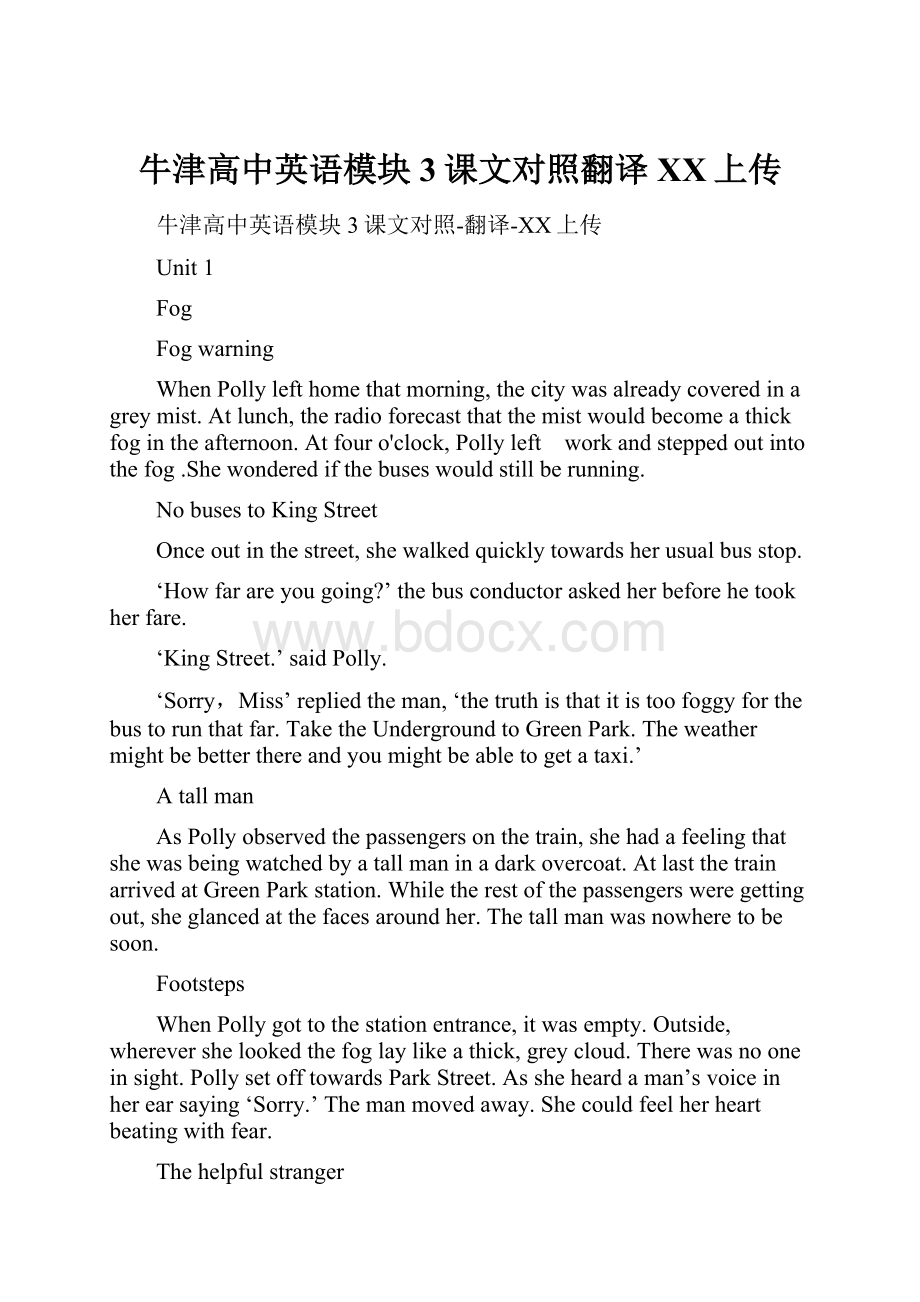牛津高中英语模块3课文对照翻译百度上传.docx
《牛津高中英语模块3课文对照翻译百度上传.docx》由会员分享,可在线阅读,更多相关《牛津高中英语模块3课文对照翻译百度上传.docx(22页珍藏版)》请在冰豆网上搜索。

牛津高中英语模块3课文对照翻译XX上传
牛津高中英语模块3课文对照-翻译-XX上传
Unit1
Fog
Fogwarning
WhenPollylefthomethatmorning,thecitywasalreadycoveredinagreymist.Atlunch,theradioforecastthatthemistwouldbecomeathickfogintheafternoon.Atfouro'clock,Pollyleft workandsteppedoutintothefog.Shewonderedifthebuseswouldstillberunning.
NobusestoKingStreet
Onceoutinthestreet,shewalkedquicklytowardsherusualbusstop.
‘Howfarareyougoing?
’thebusconductoraskedherbeforehetookherfare.
‘KingStreet.’saidPolly.
‘Sorry,Miss’repliedtheman,‘thetruthisthatitistoofoggyforthebustorunthatfar.TaketheUndergroundtoGreenPark.Theweathermightbebetterthereandyoumightbeabletogetataxi.’
Atallman
AsPollyobservedthepassengersonthetrain,shehadafeelingthatshewasbeingwatchedbyatallmaninadarkovercoat.AtlastthetrainarrivedatGreenParkstation.Whiletherestofthepassengersweregettingout,sheglancedatthefacesaroundher.Thetallmanwasnowheretobesoon.
Footsteps
WhenPollygottothestationentrance,itwasempty.Outside,wherevershelookedthefoglaylikeathick,greycloud.Therewasnooneinsight.PollysetofftowardsParkStreet.Assheheardaman’svoiceinherearsaying‘Sorry.’Themanmovedaway.Shecouldfeelherheartbeatingwithfear.
Thehelpfulstranger
Thensheheardthesoundagain-softfootstepsbehindher.Aminutebefore,shehadwishedforsomeonetocomealong.Nowshewantedtorun,butfearheldherstill.Thefootstepsseemedclosenow.Thenaman’svoicecameoutofthedarkness.‘Isanybodythere?
’
Pollyhesitated.Atlastsheanswered,‘Hello,IthinkI’mlost.’
Afewsecondslater,ahandreachedoutandgraspedherarm.Pollyfoundherselfstaringupatthefaceofanoldmanwithabeard.
‘MaybeIcanhelpyou.Whichroaddoyouwant?
’heasked.
‘Iliveat86KingStreet.’Pollyreplied.
‘Justtakemyhand.’saidtheman.‘Comewithme.You’llbeallright.’HetookPolly’shand.‘Watchoutforthestephere.’
Inhisotherhandthemancarriedastick.Pollyheardithitthestep.‘Icanremembersometerriblefogs,butmaybethatwasbeforeyourtime.Ican’tseeyourface,butyousoundyoung.Howoldareyou?
’
‘Justtwenty.’answeredPolly.
‘Ah,twenty!
Aniceagetobe.Iwasyoungonce.Nowwe’reatthecrossroads.Turnlefthere.’
‘I’mquitelostnow.Areyousureyouknowtheway?
’Pollywasbeginningtofeelfrightenedagain.’
‘Ofcourse.Youreallyshouldn’tfeelanxious,’Heheldherhandmorefirmly.
Thegratefulhelper
‘Hereweare.KingStreet.’Hestopped.
‘Thankyousomuchforcomingtomyaid.’saidPollyinrelief.‘Wouldyouliketocomeinandrestforawhile?
’
‘It’sveryniceofyou.’saidtheman,‘butI’llbeoff.Theremaybemorepeoplelosttoday,andI’dliketohelpthem.Yousee,afogthisbadisrare.Itgivesmethechancetopaybackthehelpthatpeoplegivemewhenit’ssunny.Ablindpersonlikemecan’tgetacrosstheroadwithouthelp,exceptinafoglikethis.’
P18
Project
Sharkattacks
Therearenearly400differenttypesofsharks,butonlyabout30typesareknowntohaveattackedhumanbeings.Manypeopleknowthatthemostdangeroussharkisthegreatwhiteshark,probablybecausetheyhaveseenthefilmJaws.However,twoothersharksarealsoratherdangerous:
thetigersharkandthebullshark.Contrarytowhatmanypeoplemightassume,evidenceshowsthatsharksseldomattackhumans.Therearethreetypesofshark
attacks.Inthemaintype,thesharkattacksyoubecauseitmistakesyouforafish,butwhenittasteshumanfleshitdecidestogiveupandswimsaway.Inthesecondtype,thesharkpushesyouwithitsnosetofindoutifyouarefittobeeaten,andthenbitesyouifitthinksyouare.Inthethirdtype,thesharkwaitsforyoutoswimby,andthenattacksyousuddenly.Thelasttwotypesofattackmoreoftenresultinthedeathofhumans.
Toreducetheriskofasharkattack,youshouldfollowthesesuggestions.
Donotswiminthedark.Sharkscanstillseeyoubutyoucannotseethem.
Donotgoswimmingintheoceanifyouhaveafreshwound.Sharkscansmellbloodoveralongdistance.
Donotwearbrightclothingorjewellery,becausesharksareattractedtotheflashof,coloursandbrightobjects.Stayingroups,assharksusuallyavoidlargenumbersofpeople.
Recently,sharkattackshavebeenincreasingaswatersportsarebecomingmorepopular.Ifasharkattacksyou,followtheadvicebelow.
Keepcalm.Donotpanic.
Hitthesharkonthenosewithyourfist.
Stickyourfingerintheshark'seye.
Don'tbefrightenedbysharks:
you
are3otimesmorelikelytobehitbylightningthanbeattackedbyashark.
Thewonderfulworldofpigeons
Itisnight.Allisquiet.Thesoldiersareasleepwhileaguardwatchesforthe
enemy.Thereisaflash,andthesoundofguns!
Theyarebeingattacked!
Hundredsofenemysoldiersrushtowardsthem.Theyareallgoingtobe
killedunlesstheygethelp.Whatshouldtheydo?
Anofficerwritesashortmessagequicklyonasmallpieceofpaper:
'Being
attacked!
Hurry!
'
Herollsupthepaperandputsitintoasmallcase,andthenreachesintoa
cageandgetsabird.Attachingthemessagetoitsleg,hesetsthebirdloose.It
immediatelyfliesintotheairanddisappearsinthedark.
Willthebirdarriveintime?
Willtheybesaved?
Thoughitmayseemhardtobelieve,thebirdtheofficerusesisthesamebird
oftenseeninpublicparks--thepigeon.Pigeonshaveawonderfulsenseof
directionandcanfindtheirwayhomeoverlongdistances.Indeed,pigeons
havebeenknowntoflyhomefromasfarawayas1,800kilometres.Thatis
whypigeonshavebeenusedsinceancienttimestocarrythenewsoreven
themail.However,itwasinwarthattheyfoundtheirgreatestuse.During
bothWorldWarIandII,pigeonswereemployedbyarmiestocarrymessages
toandfromthefrontlines,savingthelivesofmanysoldiersandeven
helpingwinsomeimportantvictories.
Howdopigeonsfindtheirway?
Pigeonsappeartohaveacompassinside
themthattellsthemwhichwayisnorth.Howthiscompassworksremainsa
mystery.Ofcourse,sinceacompassaloneisnotenoughtofindone'sway,
theyalsoappeartousetheirsightandeventheirsenseofsmelltotellthem
whichwaytheyshouldgo.Unlikehumans,theynevergetlostandcan
alwaysfindtheirwayhome.
Unit2
Englishanditshistory
Allthroughhistory,peoplefrommanydifferentcountriesandcultureshavelivedtogetherinBritain.TheEnglishlanguageismadeupofthegrammarandvocabularythesepeoplebroughttoBritain.ThatiswhyEnglishhassomanydifficultrulesthatconfusepeople.
OldEnglish
OldEnglishisverydifferentfromtheEnglishwespeaknowadays.Infact,wewouldnotbeabletounderstanditifweheardittoday.Beforethe5thcentury,peopleinBritainallspokealanguagecalledCeltic.ThentwoGermanicgroupsfromtheEuropeanmainland—theAnglesandtheSaxons—occupiedBritain.OldEnglishconsistedofamixtureoftheirlanguages.(BoththeEnglishlanguageandtheEnglishpeoplearenamedaftertheAngles;thewordAnglewasspeltEngleinOldEnglish.)AsidefromplacenamessuchasLondon,veryfewCelticwordsbecamepartofOldEnglish.Attheendofthe9thcentury,theVikings,peoplefromNorthernEuropeancountriessuchasDenmarkandNorway,begantomovetoBritain.Theybroughtwiththemtheirlanguages,whichalsomixedwithOldEnglish.Bythe10thcentury,OldEnglishhadbecometheofficiallanguageofEngland.
WhenwespeakEnglishtoday,wesometimesfeelpuzzledaboutwhichwordsorphrasestouse.ThisisbecauseEnglishhasmanywordsandphrasesfromdifferentlanguages,butwithsimilarmeanings.Forexample,thewordsickcamefromawordonceusedbytheAnglesandtheSaxons,whileillcamefromawordonceusedbytheNorwegians.
MiddleEnglish
MiddleEnglishisthenamegiventotheEnglishusedfromaroundthe12thtothe15thcenturies.ManythingsplayedapartinthedevelopmentofthisnewtypeofEnglish.ThemostimportantcontributionwasfromtheNormans,aFrench-speakingpeoplewhodefeatedEnglandandtookcontrolofthecountryin1066.However,theNormanConquestdidnotaffectEnglishasmushastheAnglesandtheSaxons’victoryabout600yearsearlier,whichledtoOldEnglishreplacingCeltic.EventhoughtheNormansspokeFrenchfortheentire250yearstheyruledEngland,FrenchdidnotreplaceEnglishasthefirstlanguage.Ontheotherhand,theEnglishlanguagedidborrowmanywordsfromFrench.Thisresultedinevenmorewordswithsimilarmeanings,suchasanswer(fromOldEnglish)andreply(fromOldFrench).Itisinterestingtolearnhowthewordsformostanimalsraisedforfood,suchascow,sheepandpig,camefromOldEnglish.However,thewordsforthemeatoftheseanimals,whichwasservedtotheNormans,camefromOldFrench:
beef,mutton,porkandbacon.
OldFrenchmadeothercontributionstoMiddleEnglishaswell.InOldEnglish,theGermanicwayofmakingwordspluralwasused.Forexample,theysaidhouseninsteadofhouses,andshoeninsteadofshoes.AftertheNormanstookcontrol,theybeganusingtheFrenchwayofmakingplurals,addingan-stohouseandshoe.OnlyafewwordskepttheirGermanicpluralforms,suchasman/menandchild/children.
AftertheNormanConquest,high-classpeoplespokeFrenchwhilecommonpeoplespokeEnglish.However,bythelatterhalfofthe14thcentury,EnglishhadcomeintowidespreaduseamongallclassesinEngland.In1399,HenryⅣbecameKingofEngland.HismothertonguewasEnglish,andheusedEnglishforallofficialevents.
ModernEnglish
ModernEnglishappearedduringtheRenaissanceinthe16th